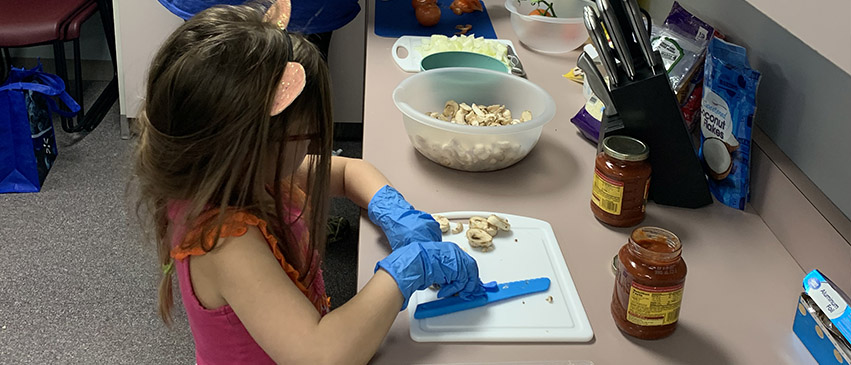
Since its formation in 1985, the Community Foundation of Central Illinois (CFCI) has been committed to addressing critical needs in our community. One need that has grown year after year is food insecurity, defined as “a lack of regular access to enough food for an active, healthy life and limited or uncertain availability of nutritionally adequate foods.” Traditionally, CFCI has focused its efforts on responding to grant requests related to this important cause. Four years ago, however, we decided to try a more proactive approach.
Ending Hunger Together
In the spring of 2016, CFCI formed a food insecurity committee to gain a better understanding of root causes and to help uncover untapped local resources. Here is a snapshot of what we learned:
- Central Illinois leaders and other nonprofits were deeply committed to addressing food insecurity, but a lack of collaboration often led to competition for limited resources and a “survival” mentality.
- Despite the community’s best efforts and allocation of significant funds, food insecurity issues continued to rise throughout the region.
- A focus on nutrition was required for any future initiatives.
- Transportation and convenience issues were substantial barriers for at-risk families, particularly in rural areas.
This important background work led to the establishment of CFCI’s Ending Hunger Together grants program. Launched in 2018, this funding initiative requires multi-organizational cooperation in the areas of healthy food access, community education and economic development. Its goals include driving meaningful collaboration, improving the amount of quality food in the emergency food system, and creating a more targeted model that focuses on underlying issues that lead to food insecurity.
A Healing Partnership
While we are just two years into this new strategy, the initial results have been encouraging. In 2019, the Ending Hunger Together program awarded funding to Healthy Eating Active Living (HEAL) food system partners, led by the Tazewell County Health Department. Those dollars helped HEAL establish partnerships with more than 20 area food system programs, create five pilot programs focused on improving nutrition, develop a model to measure and evaluate effectiveness, advance community conversations on the root causes of food insecurity, and host interactive classes on how to prepare inexpensive, healthy meals. The five pilot programs are as follows:
- Project 1: Providing the Tri-County region with consistent access to fresh, affordable fruits and vegetables while improving economic development, education in meal planning, and budgeting through community cooking classes. The results: 520 cooking class attendees completed education from two low-income housing sites, three public schools and five community organizations.
- Project 2: Improving the proportion of healthy foods offered within the emergency food system by promoting standardized, health-based categorization and labeling of food products paired with education at food banks, food pantries and in nutrition education settings. The results: Food banks utilizing standardized green-light labeling served over 70 food pantries, with an estimated 15,000 families impacted in the Tri-County region.
- Project 3: 12,000 families were to be part of a Head Start education and gardening project. However, services were discontinued as schools closed due to the pandemic.
- Project 4: The alignment of several large community gardens and community education programs to increase healthy food access, education, training and job opportunities. The results: A projected goal of increasing healthy foods into the Good Food Recovery program by 20,000 pounds in 2020.
- Project 5: The COVID-19 pandemic created challenges in reaching the most vulnerable families suffering from food insecurity, even as self-isolation, loss of employment and travel restrictions placed more families in need. The results: An emergency response was implemented to increase food delivery to homebound families impacted by the pandemic. Over 90 volunteers assisted in delivering emergency food boxes to over 1,000 individuals.
Most importantly, this collaborative is working to build a model of collaboration that moves organizations doing good, but at times siloed work into alignment. Using shared data and measurements, mutual decision making and improving resource efficiency and effectiveness is at the heart of this initiative.
“Our partnership with HEAL has been a game changer when it comes to fighting food insecurity,” notes CFCI Board President Don Shafer. “In fact, HEAL’s outstanding efforts are being recognized nationally. Because of the many programs and metrics the team has developed while working with the Community Foundation, HEAL has been named a Top 10 Initiative by the Harkin Institute of Drake University.”
Continuing Opportunities
The HEAL group was funded again in Year 2 to continue their projects from Year 1. The intent is to further develop and refine a community-based model of integration that leverages the strengths of existing programs dedicated to improving the emergency food system by increasing healthy food access, advancing community nutrition education, and creating agricultural and community development opportunities.
The City of Peoria was also funded in Year 2 for its Southside Farmers Market to address food access issues on Peoria’s Southside, create opportunities for economic growth, and engage residents in designing a Food Equity Center. Ten markets are being held through the fall, with healthcare and other area providers offering services to address the social determinants of health.
While we are proud of these successes, there is much work to be done. As a result of COVID-19’s massive impact on our region, central Illinois is on track to double the number of food-insecure families. Despite the dire outlook and data related to the pandemic, our Ending Hunger initiative will continue funding HEAL, the City of Peoria and other programs that strengthen our ability to respond locally. In our “new world,” their leadership and systems-based approach is needed now more than ever. To find out how you can make a difference in the fight against food insecurity, call (309) 674-8730 or visit communityfoundationci.org. Your continued support will help shape and enhance how CFCI is able to respond to the crisis of hunger in our community. PM
Mark Roberts is president and CEO of the Community Foundation of Central Illinois.
- Log in to post comments

